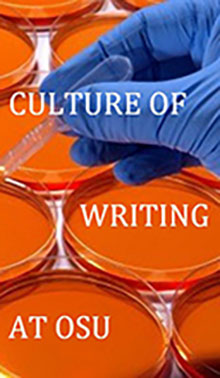
by the WIC Team
WIC and participating units strive to foster a commitment to excellence in undergraduate student writing and recognize the value of writing across the disciplines with the annual WIC Culture of Writing Awards in the disciplines.
Participation in the Culture of Writing Awards has thrived since 2006 as students earn recognition and cash awards through either individual or team writing projects. This year, participation continued to be strong, even with the obstacles of the present quarter. WIC would like to thank all participating units for their continued desire to recognize and reward outstanding student writing.
Congratulations to this year’s awardees!
| Student name | Paper Title | College | Unit | Nominating Professor |
| Ryan Wells | Alternative Approach for Soil Sterilization in Strawberry Rootstock and Fruit Productions | Agricultural Sciences | Agricultural Sciences | Lauren LaGrande |
| Emily Bradley | Housing Chickens: How Much Space is Enough? | Agricultural Sciences | Animal Sciences | Giovanna Rosenlicht & Claudia Ingham |
| Celine Huynh | Impact of Polycyclic Aromatic Hydrocarbons on Barrier Function Toxicity in 3D Lung Model from Normal and Asthmatic Donor Cells | Agricultural Sciences | BioResource Research | Katharine Field |
| Michael Sieler | The Gut Microbiome Drives Benzo[a]pyrene’s Impact on Zebrafish Behavioral Development | Agricultural Sciences | BioResource Research | Katharine Field |
| Monica Vickers | Benefits and costs of payments for environmental services in Morogoro, Tanzania | Agricultural Sciences | Environmental Economics and Policy | Jennifer Alix-Garcia |
| Katrina Ong | Reshaping Conventional Agriculture with Regenerative Agriculture | Agricultural Sciences | Sustainability | Deanna Lloyd |
| Tristen Myers | Bald Hill Mapping Project Report | CEOAS | Environmental Sciences | Mary Santelmann & Larry Becker |
| Andres Mendoza | From Cocoa to Crude Oil: The Troubled Export Economy of Ecuador | CEOAS | Geography & Geospatial Science | Larry Becker |
| Jia Yi Li | Research Implications Report for ECE Senior Design Capstone Project | Engineering | Electrical & Computer Engineering | Rachael Cate & Donald Heer |
| Sean Jim | Heavy-Payload Agriculture Drone: Imaging/Control | Engineering | Mechanical Engineering | John Parmigiani |
| Karla Aguilera | Bless Me Ultima: The Soul of the Chicano Movement | Liberal Arts | American Studies | Neil Browne |
| Logan E. McCarthy | Rituals of Recovery | Liberal Arts | Anthropology | Julianne Freeman |
| Leslie D Rowe | Deepfake Detection and Education Key to Defending the Truth | Liberal Arts | Digital Communication Arts | Alina Padilla-Miller |
| Rebekah Villanti | Defining the Novel by Conventions of Realism and Fictionality | Liberal Arts | English | Megan Ward |
| Helena Fournier | Genocide in Ukraine: The Holodomor in Archival Documents, Witness Testimony, and Contemporary Debate | Liberal Arts | History | Katherine Hubler |
| Taylor Hulett | Germaine Tailleferre: Love, Marriage, Infidelity, and Art Song | Liberal Arts | Music | Kimary Fick |
| Jordan Foos | Tyranny of the Herd: Nietzsche and Mill on Individuality | Liberal Arts | Philosophy | Robert Figueroa |
| Diego Rodriguez | A Culturally Specific, Multi-Component Suicide Prevention Program for Adolescent American Indians on Reservations | Liberal Arts | Psychology | Chris Sanchez |
| Joshua Dudley | The Impact of Religious Affiliation and Race on Perceptions of Everyday Discrimination | Liberal Arts | Sociology | Mark Edwards |
| Erin Zurbrugg | An Unexpected Journey: Finding Joy in Life’s Curveballs | Public Health and Human Sciences | Human Development and Family Sciences | Karen Hooker |
| Jynx Frederick | Benton County Condom Distribution Program | Public Health and Human Sciences | Health Promotion & Health Behavior | Kari-Lyn K. Sakuma |
| Jessica C. Brown | Synthesis and Characterization of Zeolite 5A | Science | Chemistry | Kyriakos C. Stylianou, Chong Fang, & Christine Pastorek |
| Emily Dozler | Medical research’s silent sufferers: Reasons to reduce animal testing | Science | Integrative Biology | Meta Landys |
| Richard Puro | Equilibria of Wolves and Elk in Yosemite | Science | Math | Yevgeniy Kochegov |
| Jacob Van de Lindt | Modeling the Fusion Reaction in an Inertial Electrostatic Confinement Reactor with the Particle-in-Cell Method | Science | Physics | Ethan Minot |













